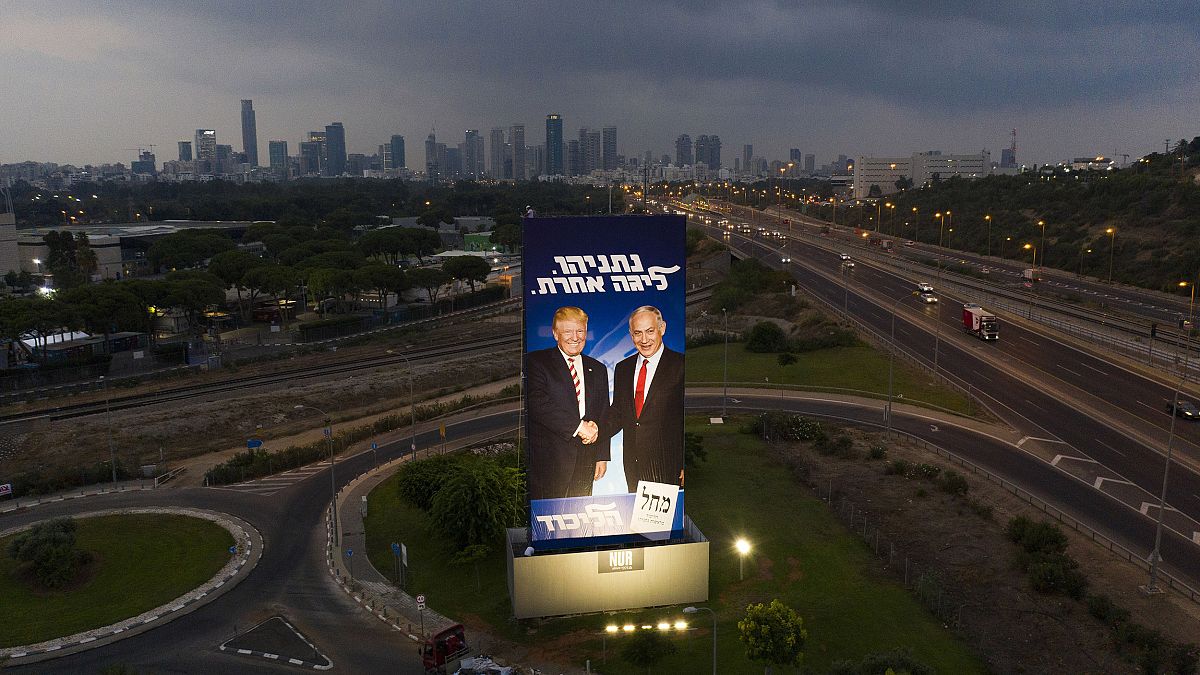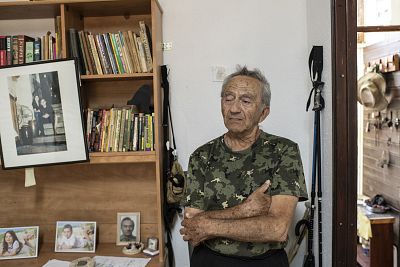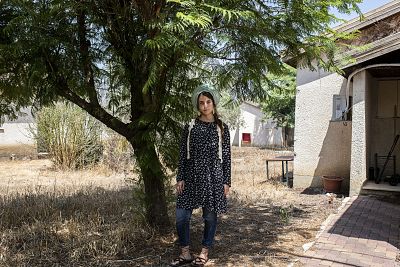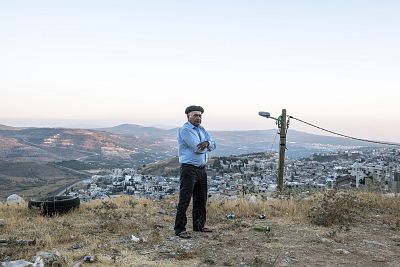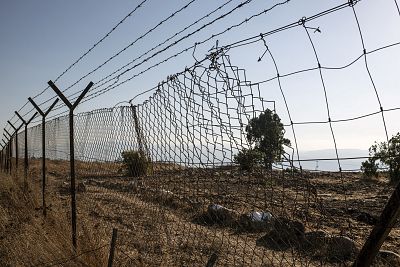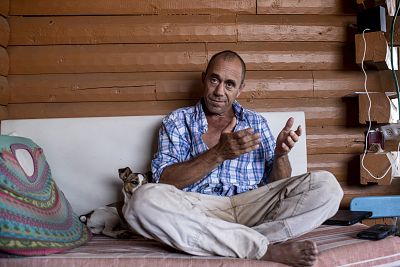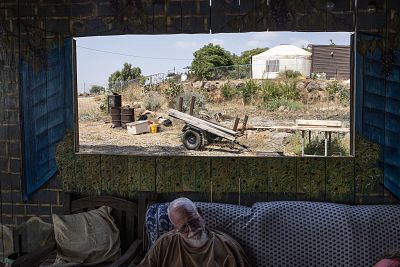As the new name shows, the Trump administration's full-throated support of Israel's right-wing government goes much further than any other U.S. administration.
BRUCHIM, Golan Heights — Ganadi Pherlman didn't flinch when a resounding "Boom!" punctured the quiet of his barbed-wire-encircled hamlet. Pherlman, 83, is used to hearing the rumblings of Israel's military around his settlement in the Golan, a volcanic plateau Israel annexed from Syria after the 1967 Arab-Israeli War.
"This is Israel, it's always like this. Over there is Lebanon and over there is Syria," he said pointing in the direction of Israel's hostile neighbors.
Nestled in fields of straw, his down-at-the-heel community, currently known as Bruchim, is home to fewer than a dozen aging inhabitants. Pherlman spoke of how he longed to again see children roam the shady paths of the community he helped to re-establish in 1991.
His dream may soon come true as the decaying hamlet is slated to be incorporated into a new settlement named after President Donald Trump. At a ceremony in June, Prime Minister Benjamin Netanyahu named the future community Trump Heights — a gesture of gratitude for the president's decision to ditch decades of U.S. foreign policyand recognize Israeli sovereignty over the Golan Heights on March 25.
But it is unclear whether the plans will ever become reality if Netanyahu is not re-elected this week — his right-wing Likud party is currently running neck-and-neck in the polls with the centrist Blue and White party. Some argue it is little more than a P.R. stunt, and that Trump Heights will never be more than a sign.
Pherlman nonetheless says he's thrilled by the prospect of a new community named after the American president.
"Trump is right, this land is part of Israel," said Pherlman, a former dog breeder, from the mainroom of his small crumbling cottage sparsely decorated with photographs of his children or himself as a Russian serviceman. "The village is a gift for him."
But not all residents of the Golan Heights will be rolling out the welcome wagon for more Israelis, whose communities in the region are considered illegal under international law. Many living here also object to the new settlement and thepresident's meddling in regional politics. As the new name shows, the Trump administration's full-throated support of Israel's right-wing government goes much further than any other U.S. administration.
Trump is more popular in Israel than in almost any other nation, with 69 percent of Israelis expressing confidence in the president, according to a Pew Research Center survey.
"Israel is the one country in the world where Trump is popular, because he is using his political bulldozer to support the right wing," said Hady Amr, who served as deputy special envoy for Israeli-Palestinian negotiations under President Barack Obama.
In 1967, Israel seized the Golan Heights in a six-day war against Syria, Egypt and Jordan, which saw some 130,000 Syrians forcibly transferred or displaced deeper into Syrian territory, according tolocal Arab rights group Al-Marsad. Israel annexed the territory in a move that was condemned by the international community as "null and void."
Decades later, the Israeli Ministry of Foreign Affairs estimates that some 40,000 people live in the region, less than half of them Jewish. The rest are Syrian Druze, a sect of Shiite Islam, and a small Alawite community — the sect of Syrian President Bashar al-Assad.
For the most part, the settlers and Syrians live separately, with Israelis residing in fenced-off communities and Druze life centered around the hillside town of Majdal Shams, whose panoramic views over southwest Syria now include a gray-snaking border fence.
Hodaya Kerman, a religiously observant Jewish tour guide, is thankful that Trump demonstrated that the Golan Heights was an "inseparable" part of Israel.
"I think he should be commended for all he is doing for Israel," said Kerman, 20. She and her husband Eyal are among some 400 families on a list of people interested in settling in Trump Heights, according to the Golan regional council.
Theirs would be the first new community to be established in the Golan Heights for 30 years, according to the council.
"It's like a gift," Kerman said.
Trump's resolve reminded her of Israel's struggle to justify its own existence, she said.
"If people in the early days were worried about what people were going to say, the country would never have developed," she said. Most countries did not recognize Israel when Jews first declared its establishment in 1948 and the country would spend the following decades fighting neighbors in a series of bloody wars, with tensions continuing today.
Support among Jewish Israelis for keeping the Golan Heights has been consistently high for decades,according to the Israel Democracy Institute. Israel regards the area as a strategic asset because its hills — which still contain the remnants of Syrian guns — overlook northern Israeli towns, particularly near the Sea of Galilee. They stress that they won the region in a "defensive war."
Since becoming president, Trump has endorsed Israel's annexation of the Golan Heights from Syria, moved the U.S. embassy from Tel Aviv to Jerusalem — which both the Israelis and Palestinians claim as their capital — and closed the Palestinian diplomatic office in Washington.
Salman Fakhraldeen, one of more than 20,000 Syrians living in the region, bemoaned Trump's disregard for international conventions, and said the president's bolstering of Israel's position was better suited to a bygone era.
"He's trying to be the big brother of the world," said Fakhraldeen, 65, who remembers the day Israeli soldiers occupied his hometown of Majdal Shams, burning the Syrian flag above his school and offering children like himself candy. "He's interfering in our interests."
But the former construction worker acknowledged that neither Trump's recognition of Israeli sovereignty nor the new settlement would change much on the ground.
"Before Trump's statement — they didn't settle in the Golan?" he asked, sipping dense Arabic coffee on the porch of his house on the steep slopes of Majdal Shams. "It's another settlement in the Golan, it can be called Trump or Balfour or I don't know what," he said, referring to former British Prime Minister Arthur Balfour, who helped pave the way for the establishment of the state of Israel.
Fakhraldeen said the Golan Heights would always be Syrian, despite Israeli claims that the remains of ancient synagogues tied the region to Judaism and therefore to Israel.
"If every nation was to reverse its history 2,000 years there would be no U.S., no Canada, no Australia," he said. "This is Syrian territory — it's well recognized under international law."
The next step to transform Trump Heights from a promised land into a reality is a cabinet meeting to approve the plans and allocate funds to establish the settlement, according to the regional council. This cannot be held before parliamentary elections on Tuesday, in which Netanyahu is fighting for his political survival.
However, because Trump Heights will incorporate the existing settlement of Bruchim, which already has a development plan, the regional council said it hopes to start building some homes before the end of the year.
Netanyahu's political critics ridiculed both the name and the settlement plans.
"This is a real joke," said Yossi Beilin, a former Israeli official who conducted secret talks that resulted in the 1993 Oslo Peace Accords, referring to Trump Heights.
"It's like the stories about the empty Russian villages that were built before the visit of the tzar so he would think these villages were full of people but they were only decoration," he said. No one was lining up to live in "this strange place," he added.
Not all Israelis living in the Golan Heights were thankful for the Trump administration's support for Israeli policy. Some of those living in the community adjacent to where Trump Heights will be built claim the land as their own and are unhappy with being associated with the American president.
Neighbors David Katz and Uri Sitnik say the land slated for development belongs to their community and said plans for it include building workshops or property where their respective children might one day live.
"I am a Zionist. I believe this is the home for the Jewish nation, but this is not Zionism," said Katz, 50, who breeds horses and farms cattle for a living. "This is an existing village, it's already destroying a society that was here."
Katz is also concerned that Trump Heights will be a religious community that will not mesh well with their secular settlement. "We live in a small community in a remote area. You need to have things in common with the other people," he said. The Golan regional council says Trump Heights will be a mixed community with both religious and secular residents.
Katz, a father of five also rejects the idea of living in a place associated with Trump.
"Would you want your daughters to live in a village named after someone that said I can grab any woman by her p----," he said, referring to a tape of Trump that was disclosed before he was elected.
Sitnik, who also opposes the settlement, said Trump's interference in regional politics also raised a potentially more problematic challenge.
In recognizing the Golan Heights as Israeli, Trump had forced the dispute back onto the international agenda, he said.
"No one was talking about the Golan," he said. "It's a dispute but it's a dispute between two nations — we don't need someone else to say this is ours or not ours."
